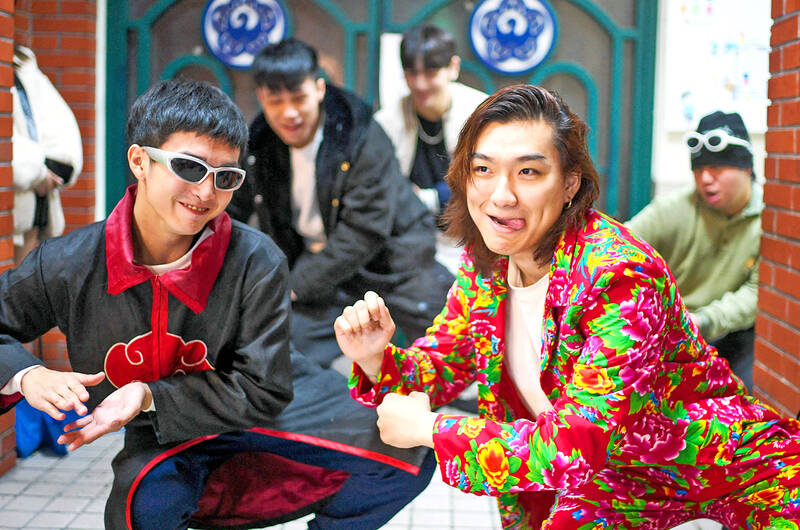Swinging side-to-side to a Chinese ditty, Taiwanese teenagers and younger children on Thursday performed at a night market competition, showing off their loose-limbed moves while executing a viral “subject three” dance that has taken social media by storm.
The competitors included young men in leather jackets and high-tops, siblings in matching denim jackets and sunglasses and even dancers improvising with pop-and-lock hip-hop moves. Yet all of them stuck to the original spirit of the kemusan (科目三) dance — which translate to “subject three.”
The style calls for dancers to look as if they are almost twisting their ankles as they flick their wrists rapidly to traditional Chinese music mixed with disco beats.

Photo: Sam Yeh, AFP
“My impression? Lots of slippery motions,” said Chang Feng, a bemused homemaker who went to Ningxia Night Market (寧夏夜市) in Taipei with her daughter to watch the aspiring trend-setters on a small stage.
Nearby, diners waited for oyster omelettes and stinky tofu at food stalls, with curious onlookers wandering over to check out the dancers.
“Seems like all the kids know how to dance kemusan — it’s a trendy thing I suppose,” Chang said.
The dance is believed to have originated from Douyin — the Chinese version of TikTok, run by the same parent company, ByteDance — with avid users jumping on the trend by performing their own versions of it, drawing millions of views.
Even businesses have tried to capitalize on the fad — such as popular hotpot chain Haidilao, whose employees twist and jerk their limbs when people order kemusan, a dish on its menu, online anecdotes and videos posted on Douyin show.
Fifth-grader Nancy Wu said she learned the dance from the platform.
“We also dance it at school. It has a demonic attractiveness to it,” the 10-year-old told reporters with an impish grin.
Yet the infectious music and jaunty moves come with a dose of controversy — some people on Facebook have accused the night market organizers of using the dance as a Chinese propaganda tool to “brainwash” young Taiwanese.
Political chatter appears to have migrated into the territory of viral Internet dances as well.
“Looks like this is a Douyin night market in China,” one person wrote in a comment on a post advertising the competition, with the comment drawing more than 230 “thumbs up.”
Ningxia Night Market Association chairman Lin Ting-kuo (林定國) said that the dance competition was purely for commercial profit. “We are using music and dance to try to increase consumer spending and promote Ningxia Night Market to the younger generation,” Lin said.
“This event is very straightforward. Don’t associate too much with it,” he said.

The Ministry of Foreign Affairs (MOFA) yesterday voiced dissatisfaction with the Comprehensive and Progressive Agreement for Trans- Pacific Partnership (CPTPP), whose latest meeting, concluded earlier the same day, appeared not to address the country’s application. In a statement, MOFA said the CPTPP commission had "once again failed to fairly process Taiwan’s application," attributing the inaction to the bloc’s "succumbing to political pressure," without elaborating. Taiwan submitted its CPTPP application under the name "Separate Customs Territory of Taiwan, Penghu, Kinmen and Matsu" on Sept. 22, 2021 -- less than a week after China

ALIGNED THINKING: Taiwan and Japan have a mutual interest in trade, culture and engineering, and can work together for stability, Cho Jung-tai said Taiwan and Japan are two like-minded countries willing to work together to form a “safety barrier” in the Indo-Pacific region, Premier Cho Jung-tai (卓榮泰) yesterday said at the opening ceremony of the 35th Taiwan-Japan Modern Engineering and Technology Symposium in Taipei. Taiwan and Japan are close geographically and closer emotionally, he added. Citing the overflowing of a barrier lake in the Mataian River (馬太鞍溪) in September, Cho said the submersible water level sensors given by Japan during the disaster helped Taiwan monitor the lake’s water levels more accurately. Japan also provided a lot of vaccines early in the outbreak of the COVID-19 pandemic,

Kaohsiung Mayor Chen Chi-mai (陳其邁) on Monday announced light shows and themed traffic lights to welcome fans of South Korean pop group Twice to the port city. The group is to play Kaohsiung on Saturday as part of its “This Is For” world tour. It would be the group’s first performance in Taiwan since its debut 10 years ago. The all-female group consists of five South Koreans, three Japanese and Tainan’s Chou Tzu-yu (周子瑜), the first Taiwan-born and raised member of a South Korean girl group. To promote the group’s arrival, the city has been holding a series of events, including a pop-up

A home-style restaurant opened by a Taiwanese woman in Quezon City in Metro Manila has been featured in the first-ever Michelin Guide honoring exceptional restaurants in the Philippines. The restaurant, Fong Wei Wu (豐味屋), was one of 74 eateries to receive a “Michelin Selected” honor in the guide, while one restaurant received two Michelin stars, eight received one star and 25 were awarded a “Bib Gourmand.” The guide, which was limited to restaurants in Metro Manila and Cebu, was published on Oct. 30. In an interview, Feng Wei Wu’s owner and chef, Linda, said that as a restaurateur in her 60s, receiving an